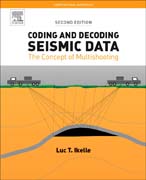
Coding and Decoding Seismic Data: The Concept of Multishooting, Second Editionoffers a thorough investigation of modern techniques for collecting, simulating, and processing multishooting data. Currently, the acquisition of seismic surveys is performed as a sequential operation in which shots are computed separately, one after the other. The cost of performing various shots simultaneously is almost identical to that of one shot; thus, the benefits of using the multishooting approach for computing seismic surveys are enormous. By using this approach, the longstanding problem of simulating a three-dimensional seismic survey can be reduced to a matter of weeks. Providing both theoretical and practical explanations of the multishooting approach, including case histories, this book is an essential resource for exploration geophysicists and practicing seismologists. Investigates how to collect, stimulate, and process multishooting dataAddresses the improvements in seismic characterization and resolution that can be expected from multishooting dataProvides information for the oil and gas exploration and production business on the benefits of multishooting data, helping to influence their day-to-day surveying techniquesIncludes robust decoding methods of undetermined mixtures, nonlinear decoding, the use of constraints in decoding processes, and nonlinear imaging of undecoded dataIncludes access to a companion site with answers to questions posed in the book INDICE: 1. Introduction to Multishooting: Challanges and Rewards 2. Mathematics of Statistical Decoding: Linear Instantaneous Mixtures 3. Mathematics of statistical decoding: Nonlinear Instantaneous Mixtures 4. Mathematics of Statistical Decoding: Convolutive Mixtures 5. The Decoding and Demultiple of Instantaneous Mixtures 6. Decoding Methods for Underdetermined Convolutive Mixtures 7. Imaging of Multishot Data 8. Case Histories Appendix A. Nonnegative matrix factorization Appendix B. Nonnegative tensor factorization Appendix C. A review of 3D finite-difference modeling Appendix D. Wave Propagation
- ISBN: 978-0-12-811098-0
- Editorial: Elsevier
- Encuadernacion: Rústica
- Páginas: 650
- Fecha Publicación: 01/06/2017
- Nº Volúmenes: 1
- Idioma: Inglés
